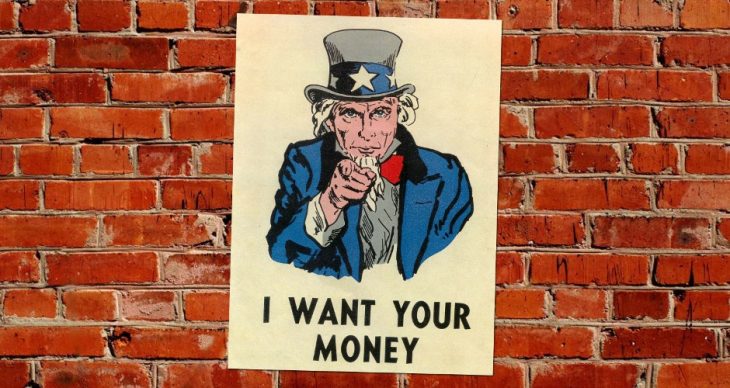
Word of the Day: Potentate
Today’s word of the day, thanks to WordThink.com, is potentate, which the website defines as “One who has the power and position to rule over others: A monarch or ruler.” Dictionary.com defines it as “a person who possesses great power, as a sovereign, monarch, or ruler.” Pretty close. The pronunciation is / ˈpoʊt nˌteɪt /. The apostrophe-looking thing before poʊt tells you that the syllable which follows receives primary stress. The comma-looking thing before teɪt tells you that the syllable which follows receives secondary stress.
Etymonline.com says that the word came into the English language around “1400, from Old French potentat and directly from Late Latin potentatus ‘a ruler,’ also ‘political power, from Latin potentatus ‘might, power, rule, dominion,’ from potentem (nominative potens) ‘powerful,’ from potis ‘powerful, able, capable; possible;’ of persons, ‘better, preferable; chief, principal; strongest, foremost,’ from PIE root *poti- ‘powerful; lord.’”
On this date in 1913, the 16th Amendment to the USA Constitution was ratified when Delaware became the 36th state to approve it. The 16th Amendment says, “The Congress shall have power to lay and collect taxes on incomes, from whatever source derived, without apportionment among the several States, and without regard to any census or enumeration.”
Prior to the passage of the 16th Amendment, the federal government derived its revenue primarily from tariffs on goods imported into the country. An income tax was proposed way back in 1812, to fund the War of 1812, but it was never implemented. In 1861, Congress passed an income tax to fund the Civil War; at first, it took 3% of income over $800 per year, and then in 1862 it was revised to be a graduated tax (the percentage increasing on higher income levels) of 3-5% on income over $600. This income tax brought in a lot of revenue, particularly from the industrial states where wages were higher.
The Wilson-Gorman Act or Revenue Act of 1894 reinstituted the income tax, but it was struck down in 1895 by the Supreme Court of the United States in the Pollock v. Farmer’s Loan and Trust Co. case. The law was passed after the Democratic Party took control of Congress in 1892. It had made tariff reduction one of its campaign planks, and tariffs, it was argued, were a regressive tax, particularly on Southern and Western residents.
Even before Pollock, but especially after it, a number of parties advocated in favor of a federal income tax, specifically the Democrats, the Progressives (an offshoot of the Republican Party led by Teddy Roosevelt), and the Socialists. In 1909, when President William Howard Taft proposed a new income tax, and that same year several senators proposed Constitutional amendments, one of which was finally accepted, approved, and sent out to the states for ratification.
Here is how Wikipedia explains the rationale for the income tax: “Democrats, Progressives, Populists and other left-oriented parties argued that tariffs disproportionately affected the poor, interfered with prices, were unpredictable, and were an intrinsically limited source of revenue. The South and the West tended to support income taxes because their residents were generally less prosperous, more agricultural and more sensitive to fluctuations in commodity prices. A sharp rise in the cost of living between 1897 and 1913 greatly increased support for the idea of income taxes, including in the urban Northeast. A growing number of Republicans also began supporting the idea, notably Theodore Roosevelt and the ‘Insurgent’ Republicans (who would go on to form the Progressive Party). These Republicans were driven mainly by a fear of the increasingly large and sophisticated military forces of Japan, Britain and the European powers, their own imperial ambitions and the perceived need to defend American merchant ships. Moreover, these progressive Republicans were, as the name suggests, convinced that central governments could play a positive role in national economies. A bigger government and a bigger military, of course, required a correspondingly larger and steadier source of revenue to support it.” In other words, the political elites convinced the states that the solution to economic problems was bigger central government, and they used fear mongering to convince those unconvinced by the economic arguments.
The Revenue Act of 1913 imposed an income tax on all of America. The lowest rate was 1% on income up to $20,000. The highest rate was 7% on income of $500,000 (the equivalent of over $12 million in 2019 dollars). That seems like nothing compared to tax rates today, but even with much higher tax rates, our current federal government overspends its revenue by nearly $1 trillion each year. The Revenue Act of 1916 imposed an estate tax on the entire nation to go with the income tax (an estate tax is a tax on a person’s estate when s/he dies—effectively a double tax since the income earned to acquire the wealth was taxed initially.
During the so-called Progressive Era of American politics, a number of other changes were made, most notably an amendment taking the power of electing senators away from state legislatures and giving it to a popular vote. These changes were all designed to increase the power of the federal government, and they succeeded.
Some people complain that Donald Trump is a dictator, and before him other people complained that Barack Obama was a dictator. What both sides need to recognize is that the federal government has been passing laws, and the federal Supreme Court has been approving these laws, that are designed to make the federal government more powerful. Yes, the politicians make promises that life will be so much better if we just give DC more power, but eventually we really are going to end up with a potentate. In my opinion, that will be a sad day.
The image was published originally by Evalyn Bennett on April 9, 2017.